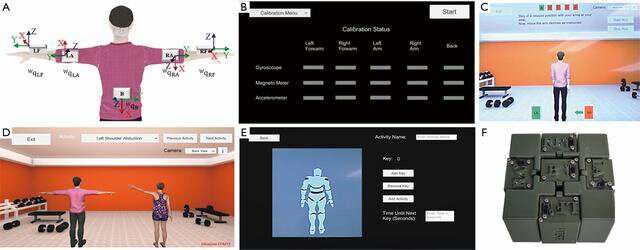#Usability study of wearable inertial sensors for exergames (WISE) for movement assessment and exercise

“#Usability study of wearable inertial sensors for exergames (WISE) for movement assessment and exercise”

Recent years have seen a brisk rise in development and deployment of digital health systems using such technologies as wearable sensors and embedded controllers to enhance access to medical diagnostics and treatments. Because of an accelerating trend in the number of stroke survivors requiring rehabilitation, healthcare services worldwide are considering technological solutions to enhance accessibility to assessment and treatment, particularly during the past year’s period of enforced quarantine due to COVID-19.
Some of the challenges faced by these technologies are clinical acceptance, high equipment cost, accuracy, and ease of use.
To address these limitations, the researchers designed wearable inertial sensors for exergames (WISE), a system that includes an animated virtual coach to deliver instruction, and a subject- model whose movements are animated by real-time sensor measurements from the WISE system worn by a subject. The paper examines the WISE system’s accuracy and usability for the assessment of upper limb range of motion (ROM).
The system uses five wearable sensor modules affixed to a user’s upper body: above the wrist on the left and right forearms, above the elbow on the left and right arms, and on the back. Each WISE sensor module consists of a sensor interfaced with a microcontroller soldered to a printed circuit board, which is connected to a lithium-ion battery. A storage and calibration cube is designed and 3-D-printed to house the five WISE system modules and simultaneously calibrate all the sensors prior to placement on a subject. The microcontroller retrieves absolute orientation measurement from the sensor and wirelessly streams it to a computer. The investigators used a Unity3D-based exergame interface to animate the sensor data into a 3-D-human model.
Seventeen neurologically intact subjects were recruited to participate in a usability study of the WISE system. The subjects performed a series of shoulder and elbow exercises for each arm instructed by the animated virtual coach; accuracy of the ROM measurements obtained with the WISE system were compared with those obtained with a system using the Microsoft Kinect markerless motion capture system (a platform used for exergames and often tested for rehabilitation capabilities). The results suggest the WISE system performs as well as Kinect.
The researchers plan future studies with patient populations in clinical and tele-rehabilitation settings.
Ashwin Rajkumar et al. Usability study of wearable inertial sensors for exergames (WISE) for movement assessment and exercise, mHealth (2021). DOI: 10.21037/mhealth-19-199
Citation:
Usability study of wearable inertial sensors for exergames (WISE) for movement assessment and exercise (2021, February 15)
retrieved 15 February 2021
from https://techxplore.com/news/2021-02-usability-wearable-inertial-sensors-exergames.html
This document is subject to copyright. Apart from any fair dealing for the purpose of private study or research, no
part may be reproduced without the written permission. The content is provided for information purposes only.
If you liked the article, do not forget to share it with your friends. Follow us on Google News too, click on the star and choose us from your favorites.
For forums sites go to Forum.BuradaBiliyorum.Com
If you want to read more Like this articles, you can visit our Science category.



